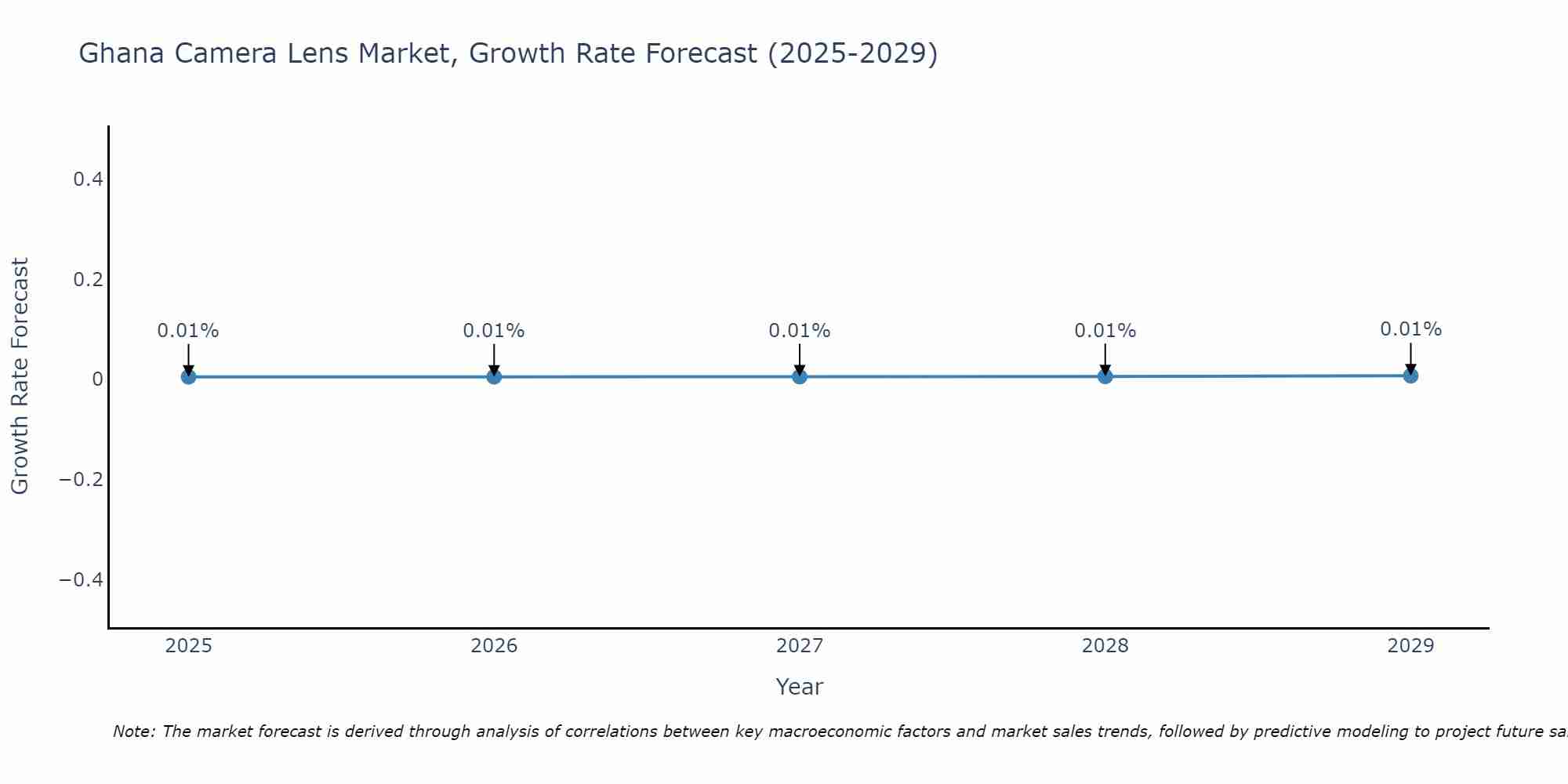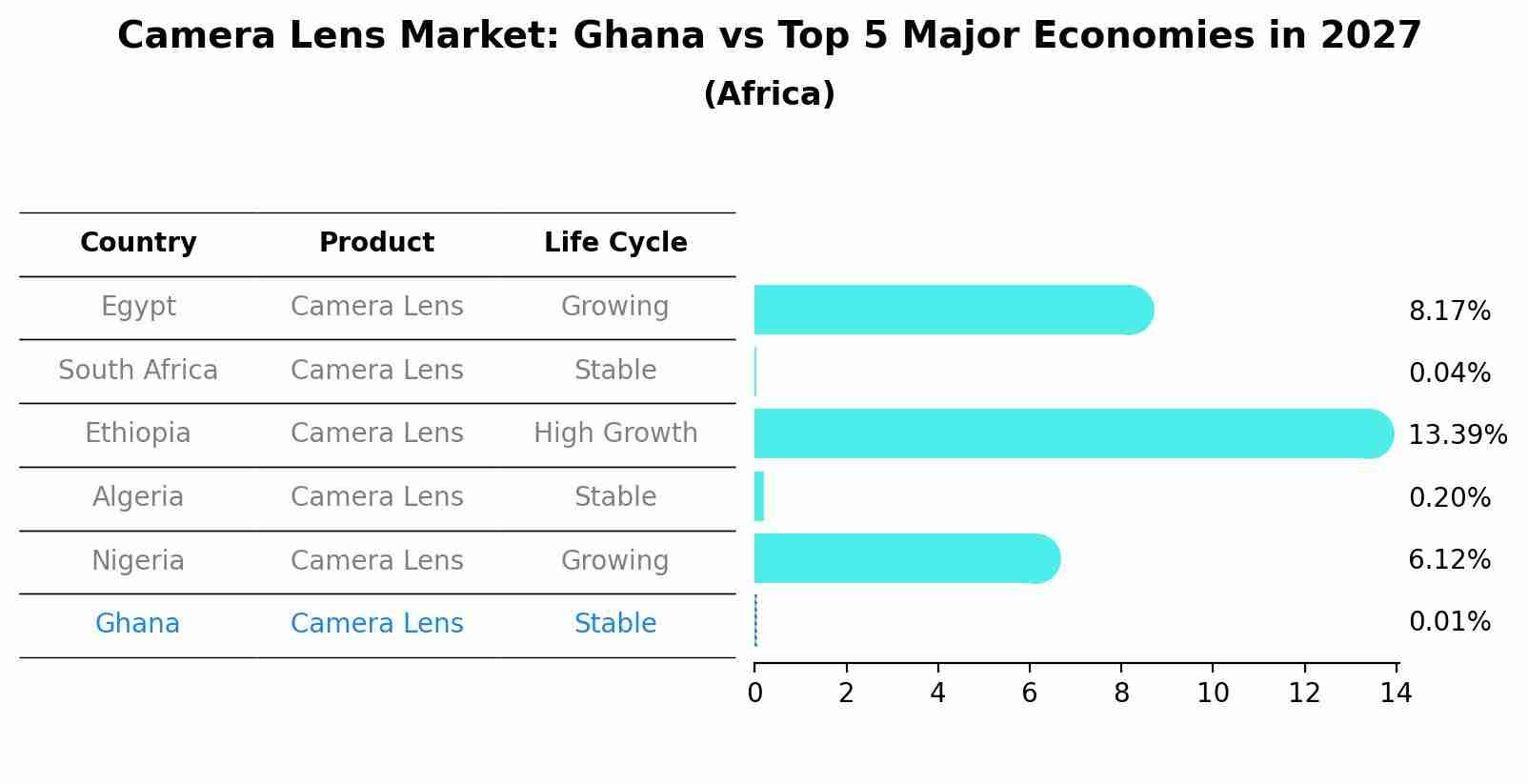Ghana Camera Lens Market (2025-2031) Outlook | Forecast, Growth, Trends, Analysis, Share, Revenue, Companies, Size, Industry & Value
| Product Code: ETC362456 | Publication Date: Aug 2022 | Updated Date: Aug 2025 | Product Type: Market Research Report | |
| Publisher: 6Wresearch | Author: Summon Dutta | No. of Pages: 75 | No. of Figures: 35 | No. of Tables: 20 |
Ghana Camera Lens Market Size Growth Rate
The Ghana Camera Lens Market is poised for steady growth rate improvements from 2025 to 2029. The growth rate starts at 0.01% in 2025 and reaches 0.01% by 2029.

Camera Lens Market: Ghana vs Top 5 Major Economies in 2027 (Africa)
By 2027, Ghana's Camera Lens market is forecasted to achieve a stable growth rate of 0.01%, with Egypt leading the Africa region, followed by South Africa, Ethiopia, Algeria and Nigeria.

Ghana Camera Lens Market Synopsis
The Ghana Camera Lens Market is witnessing steady growth driven by the increasing popularity of photography as a hobby and the rising demand for high-quality images across various industries. The market is dominated by major players offering a wide range of camera lenses catering to different needs, from professional photographers to amateurs. With the advancements in technology, there is a growing preference for mirrorless cameras, leading to a surge in demand for compatible lenses. Additionally, the rise of social media platforms has further boosted the market as more individuals seek to capture and share visually appealing content. The market is expected to continue its growth trajectory, fueled by innovation, affordability, and the expanding digital photography landscape in Ghana.
Ghana Camera Lens Market Trends
The Ghana Camera Lens Market is experiencing a shift towards higher quality and more advanced lenses, driven by the increasing popularity of photography as a hobby and the growing demand for professional-grade equipment. Consumers are seeking lenses with features such as image stabilization, faster autofocus, and better low-light performance. There is also a rising interest in niche lenses such as macro and wide-angle lenses, catering to specific photography needs. Additionally, with the rise of social media platforms like Instagram, there is a trend towards lenses that can produce unique and visually appealing effects for sharing online. Overall, the market is evolving towards providing a wider range of options for photographers of all skill levels, reflecting the growing diversity of photography styles and preferences in Ghana.
Ghana Camera Lens Market Challenges
In the Ghana camera lens market, one of the main challenges faced is the presence of counterfeit products. The proliferation of fake camera lenses not only undermines the reputation of genuine brands but also poses risks to consumers in terms of quality and performance. Additionally, the limited availability of specialized camera lenses in the market can hinder photographers and videographers from accessing a wide range of options for their creative projects. Furthermore, the high cost of importing camera lenses due to tariffs and taxes can make it challenging for professionals and enthusiasts to afford high-quality equipment, affecting the overall growth of the market. These challenges highlight the importance of implementing stricter regulations, increasing consumer awareness, and fostering partnerships with reputable suppliers to address the issues in the Ghana camera lens market.
Ghana Camera Lens Market Investment Opportunities
The Ghana Camera Lens Market presents several investment opportunities due to the increasing interest in photography and videography among consumers. With the rise of social media platforms and content creation, there is a growing demand for high-quality camera lenses that can enhance the visual output of photographers and videographers. Investing in distributing popular camera lens brands, providing photography workshops and training sessions, or developing innovative lens technology tailored to local market needs could be lucrative ventures. Additionally, focusing on marketing strategies to target professional photographers, hobbyists, and content creators in Ghana can help capture a significant share of the market. Overall, the Ghana Camera Lens Market offers potential for growth and profitability for investors looking to capitalize on the burgeoning photography industry in the country.
Jordan Agar Market Government Policies
The government of Ghana has implemented policies to promote the growth of the camera lens market in the country. These policies include reducing import tariffs on camera lenses to make them more affordable for consumers and businesses, as well as providing incentives for local production and assembly of camera lenses to boost domestic manufacturing capabilities. Additionally, the government has established regulations to ensure quality standards and consumer protection in the camera lens market. By creating a conducive environment for both importation and local production, Ghana aims to stimulate growth in the camera lens market, support innovation and technology transfer, and ultimately contribute to the development of the country`s photography and imaging industry.
Ghana Camera Lens Market Future Outlook
The future outlook for the Ghana camera lens market appears promising, driven by the increasing adoption of photography as a hobby and the growing popularity of social media platforms. With a rising middle-class population and advancements in smartphone camera technology, there is a growing demand for high-quality camera lenses to enhance photography skills and capture stunning visuals. Additionally, the trend of vlogging and content creation on platforms like YouTube and Instagram is fueling the demand for specialized lenses among amateur and professional photographers alike. As disposable income levels rise and consumer preferences shift towards visual storytelling, the Ghana camera lens market is expected to experience steady growth in the coming years, presenting opportunities for both domestic retailers and international manufacturers to expand their presence in the region.
Key Highlights of the Report:
- Ghana Camera Lens Market Outlook
- Market Size of Ghana Camera Lens Market, 2024
- Forecast of Ghana Camera Lens Market, 2031
- Historical Data and Forecast of Ghana Camera Lens Revenues & Volume for the Period 2021 - 2031
- Ghana Camera Lens Market Trend Evolution
- Ghana Camera Lens Market Drivers and Challenges
- Ghana Camera Lens Price Trends
- Ghana Camera Lens Porter's Five Forces
- Ghana Camera Lens Industry Life Cycle
- Historical Data and Forecast of Ghana Camera Lens Market Revenues & Volume By Application for the Period 2021 - 2031
- Historical Data and Forecast of Ghana Camera Lens Market Revenues & Volume By Consumer Electronics for the Period 2021 - 2031
- Historical Data and Forecast of Ghana Camera Lens Market Revenues & Volume By Automotive for the Period 2021 - 2031
- Historical Data and Forecast of Ghana Camera Lens Market Revenues & Volume By Medical for the Period 2021 - 2031
- Historical Data and Forecast of Ghana Camera Lens Market Revenues & Volume By Other Applications for the Period 2021 - 2031
- Historical Data and Forecast of Ghana Camera Lens Market Revenues & Volume By Distribution Channel for the Period 2021 - 2031
- Historical Data and Forecast of Ghana Camera Lens Market Revenues & Volume By Online for the Period 2021 - 2031
- Historical Data and Forecast of Ghana Camera Lens Market Revenues & Volume By Offline for the Period 2021 - 2031
- Ghana Camera Lens Import Export Trade Statistics
- Market Opportunity Assessment By Application
- Market Opportunity Assessment By Distribution Channel
- Ghana Camera Lens Top Companies Market Share
- Ghana Camera Lens Competitive Benchmarking By Technical and Operational Parameters
- Ghana Camera Lens Company Profiles
- Ghana Camera Lens Key Strategic Recommendations
Frequently Asked Questions About the Market Study (FAQs):
Export potential assessment - trade Analytics for 2030
Export potential enables firms to identify high-growth global markets with greater confidence by combining advanced trade intelligence with a structured quantitative methodology. The framework analyzes emerging demand trends and country-level import patterns while integrating macroeconomic and trade datasets such as GDP and population forecasts, bilateral import–export flows, tariff structures, elasticity differentials between developed and developing economies, geographic distance, and import demand projections. Using weighted trade values from 2020–2024 as the base period to project country-to-country export potential for 2030, these inputs are operationalized through calculated drivers such as gravity model parameters, tariff impact factors, and projected GDP per-capita growth. Through an analysis of hidden potentials, demand hotspots, and market conditions that are most favorable to success, this method enables firms to focus on target countries, maximize returns, and global expansion with data, backed by accuracy.
By factoring in the projected importer demand gap that is currently unmet and could be potential opportunity, it identifies the potential for the Exporter (Country) among 190 countries, against the general trade analysis, which identifies the biggest importer or exporter.
To discover high-growth global markets and optimize your business strategy:
Click Here- Single User License$ 1,995
- Department License$ 2,400
- Site License$ 3,120
- Global License$ 3,795
Search
Thought Leadership and Analyst Meet
Our Clients
Related Reports
- India Switchgear Market Outlook (2026 - 2032) | Size, Share, Trends, Growth, Revenue, Forecast, Analysis, Value, Outlook
- Pakistan Contraceptive Implants Market (2025-2031) | Demand, Growth, Size, Share, Industry, Pricing Analysis, Competitive, Strategic Insights, Strategy, Consumer Insights, Analysis, Investment Trends, Opportunities, Revenue, Segments, Value, Segmentation, Supply, Forecast, Restraints, Outlook, Competition, Drivers, Trends, Companies, Challenges
- Sri Lanka Packaging Market (2026-2032) | Outlook, Competition, Drivers, Trends, Demand, Pricing Analysis, Competitive, Strategic Insights, Companies, Challenges, Strategy, Consumer Insights, Analysis, Investment Trends, Opportunities, Growth, Size, Share, Industry, Revenue, Segments, Value, Segmentation, Supply, Forecast, Restraints
- India Kids Watches Market (2026-2032) | Strategy, Consumer Insights, Analysis, Investment Trends, Opportunities, Growth, Size, Share, Industry, Revenue, Segments, Value, Segmentation, Supply, Forecast, Restraints, Outlook, Competition, Drivers, Trends, Demand, Pricing Analysis, Competitive, Strategic Insights, Companies, Challenges
- Saudi Arabia Core Assurance Service Market (2025-2031) | Strategy, Consumer Insights, Analysis, Investment Trends, Opportunities, Growth, Size, Share, Industry, Revenue, Segments, Value, Segmentation, Supply, Forecast, Restraints, Outlook, Competition, Drivers, Trends, Demand, Pricing Analysis, Competitive, Strategic Insights, Companies, Challenges
- Romania Uninterruptible Power Supply (UPS) Market (2026-2032) | Industry, Analysis, Revenue, Size, Forecast, Outlook, Value, Trends, Share, Growth & Companies
- Saudi Arabia Car Window Tinting Film, Paint Protection Film (PPF), and Ceramic Coating Market (2025-2031) | Strategy, Consumer Insights, Analysis, Investment Trends, Opportunities, Growth, Size, Share, Industry, Revenue, Segments, Value, Segmentation, Supply, Forecast, Restraints, Outlook, Competition, Drivers, Trends, Demand, Pricing Analysis, Competitive, Strategic Insights, Companies, Challenges
- South Africa Stationery Market (2025-2031) | Share, Size, Industry, Value, Growth, Revenue, Analysis, Trends, Segmentation & Outlook
- Afghanistan Rocking Chairs And Adirondack Chairs Market (2026-2032) | Size & Revenue, Competitive Landscape, Share, Segmentation, Industry, Value, Outlook, Analysis, Trends, Growth, Forecast, Companies
- Afghanistan Apparel Market (2026-2032) | Growth, Outlook, Industry, Segmentation, Forecast, Size, Companies, Trends, Value, Share, Analysis & Revenue
Industry Events and Analyst Meet
Whitepaper
- Middle East & Africa Commercial Security Market Click here to view more.
- Middle East & Africa Fire Safety Systems & Equipment Market Click here to view more.
- GCC Drone Market Click here to view more.
- Middle East Lighting Fixture Market Click here to view more.
- GCC Physical & Perimeter Security Market Click here to view more.
6WResearch In News
- Doha a strategic location for EV manufacturing hub: IPA Qatar
- Demand for luxury TVs surging in the GCC, says Samsung
- Empowering Growth: The Thriving Journey of Bangladesh’s Cable Industry
- Demand for luxury TVs surging in the GCC, says Samsung
- Video call with a traditional healer? Once unthinkable, it’s now common in South Africa
- Intelligent Buildings To Smooth GCC’s Path To Net Zero


















